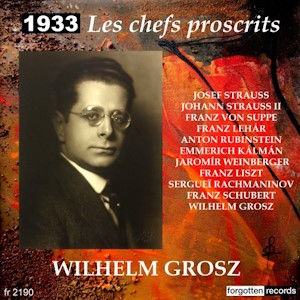
Wilhelm Grosz (conductor)
1933: Les Chefs proscrits
Members of the Berlin Philharmonic Orchestra
Schallplatten-Volksverband
Unidentified symphony orchestra
Ultraphon-Sinfonie-Orchester
Max Hansen (singer)/Jazz Symphony Orchestra
Wilhelm Grosz (piano)
rec. Berlin, 1929-31
Forgotten Records FR2190 [78]
This is another in Forgotten Records’ discs of conductors whose careers were wrecked by the rise of the National Socialists in 1933. The records are from the collection of Eric Faleur who has made a study of German recordings of the time and you can read more about this in the notes to these releases as, unusually for FR, they provide an extensive booklet in French and English for these particular releases.
This volume is devoted to Wilhelm Grosz (1894-1939), Viennese-born but who flew under the name of ‘Hugh Williams’ when he moved to England, for commercial reasons. He died in a car accident in New York. Forgotten Records have inadvertently put his date of birth as 1904 in the booklet but they have it right on the back of the jewel case. He was a legitimate composer, as many will know – I’ve recently reviewed his memorable absurdist opera Achtung, Aufnahme!! (review) – who studied with Schreker at the Vienna Conservatory and at a young age was appointed conductor of the Mannheim Opera. Soon after he moved into the cabaret milieu working with Brecht and Walter Mehring, crafting mordant, satiric songs, and branching out into films. He wrote three operas, ballets, stage music, music for his own instrument, the piano, and more besides.
When he was appointed director of the Ultraphon recording company in Berlin in 1927 he had a perfect conduit for his recordings and could draw on his own label’s orchestra as well as on a couple of much smaller outfits and members of the Berlin Philharmonic. The sequence of 78s in this CD date from 1929 to 1931 and offer a large tranche of Viennese waltz classics, as befits a man born in the city. Some are truncated, or abridged, but that was a familiar situation with 78s and a number are heard in his own arrangements.
The Schallplatten-Volksverband prove a touch under-rehearsed in their Josef Strauss example and Grosz’s rubati catch them out at one point. That Grosz enjoyed teasing use of rubato is evident throughout, not least in Johann Strauss’ Seid umschlungen Millionen Waltz where the members of the Berlin Philharmonic engage in plenty of portamenti in Ultraphon’s echo-laden recording hall. The discs were clearly aimed at a cheerful middle-brow late-Weimar audience for whom the use of a Hawaiian guitar in Geschichten aus dem Wienerwald wouldn’t prove upsetting. There is some repertoire overlap between these ‘chefs proscrits’ as both Viebig and Grosz essay popular overtures such as Suppé’s Die schöne Galathée – Grosz for Telefunken in 1929 with the Berlin Philharmonic and Viebig for Electrola two years earlier with the orchestra of the Staatsoper Berlin. There’s also an attractive, extended nine-minute ‘fantasie’ from Kálmán’s Fortissimo.
In addition to his Lehár-Suppé-Strauss duties, Grosz turned his hand to tinkling away at the piano accompanied by a coterie of players as they essayed pops pieces for Telefunken in 1930 – Rubinstein, Liszt and that Rachmaninov Prelude, this last complete with Ultraphon’s studio bells. These recordings are not quite Semprini but along the same lines (I happen to admire Semprini: it’s not a dig). The last piece is one of Grosz’s songs, the only example of his own music here, from a 1931 film, featuring the ingratiating popular singer Max Hansen and conducted by the composer. It was pretty nearly the end of the road for Grosz in Germany but he was to go on to work successfully in England before meeting his sad early death.
The CD (only) of my review copy has Ernst Viebig’s name on it, not that of Grosz, but I’m sure this is a production glitch.
The copies used are very clean and crisp and have been reproduced well. This series is restoring some fine examples of popular music from Berlin.
Jonathan Woolf
| Availability |  |
Johann Strauss II (1825-1899)
Morgenblätter Waltz, Op.279 arr Wilhelm Grosz
Seid umschlungen Millionen Waltz, Op.443
Annen-Polka, Op.117
Tritsch-Tratsch Polka, Op.214
Geschichten aus dem Wienerwald, Op.325
Kunstlerleben Waltz, Op.316
Josef Strauss (1827-1870)
Aquarellen-Waltzer, Op.258
Franz von Suppé (1819-1895)
Die schöne Galathée: overture
Franz Lehár (1870-1948)
Gold und Silber Waltz, Op.79
Anton Rubinstein (1829-1894)
Valse caprice, Op.118
Emmerich Kálmán (1882-1953)
Fortissimo: fantasie
Jaromír Weinberger (1896-1967)
Švanda dudák: fantasie
Franz Liszt (1811-1886)
Liebesträume No.3, S151 No.3
Sergei Rachmaninov (1873-1943)
Prelude Op.3 No.2
Franz Schubert (1797-1828)
Marche Militaire, Op.51, D733 No.1
Moment musical, D780 No.3
Wilhelm Grosz (1894-1939)
Wer nimmt die Liebe Ernst?

















